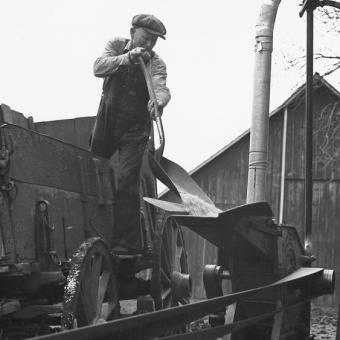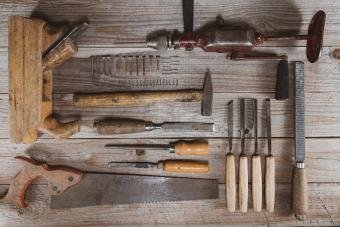
Antique hammer mills were vital pieces piece of farm and mill equipment that were used for crushing material such as rocks, grain, wood, or waste. While these machines may have evolved from their humble beginnings into highly efficient tools, their clunkier ancestors from the turn of the century can still put in a hard day's work, whether that's by working on the farm or getting toured around your local area.
How Hammer Mills Work
A hammer mill uses forceful impact to pulverize material through a high speed rotating disc that has a fixed number of hammer bars, and the hammer bars are swung outward by centrifugal force. Raw material is fed into and then thrown out of the machine using centrifugal force, and it's crushed by being beaten between the hammer bars or against the breaker plates that are fixed inside of the casing.

These raw materials are pulverized until they're small enough to fall through the screen, which forms the lower part of the casing. Hard materials won't damage the hammer mill because the bars are hinged, but when the bars become worn out, they have to be replaced.
Hammer mills are capable of crushing brittle materials as well as fibrous materials. When crushing fibrous material, a screen with cutting edges can be used. The size of the crushed material depends on the size of the screen and the rotation speed.
How Hammer Mills Are Used in Different Fields
While the most common use for hammer mills is agriculturally based, these machines were also designed for industrial, research, and residential applications.

Industrial uses for hammer mills can include producing pulp for paper production, grinding grain for biofuel production, and grinding wood scrap into mulch for manufacturing wood pellets for fuel. An automobile junkyard uses large hammer mills for grinding scrap metal into small pieces which can be separated for recycling purposes. Other types of hammer mills are used to break down asphalt, electronics, and old tires for the purpose of recycling this material.
The smallest type of hammer mills can actually fit on a tabletop or counter. For example, a laboratory might use a hammer mill to grind material for an experiment. Small hammer mills can also be used to grind foods or spices.
Hammer Mill Brands to Collect
Many different hammer mill designs have been produced over the years, and in the 1920s, hammer mills became a popular alternative to the traditional burr mills and feed grinders of the period. The hammer mill was faster at reducing small grains to a very fine consistency without wearing out machine parts. New manufacturers and new models of hammer mills continued to be produced throughout the 1930s. However, the Great Depression and World War II took a toll on the production of new farm equipment, which all but ceased completely during the war.
There were a number of manufacturers who made agricultural hammer mills, including:
- John Deere
- David Bradley
- Westmore
- Sears Roebuck
- Montgomery Ward
- Fairbanks-Morse
- Gehl
- Bearcat
- Meyers-Sherman Co.
- Holmes Bros.
These are the types of common brand names you will come across when looking to buy a hammer mill.
Different Hammer Mill Models That Were in Style
In addition to brands, you'll find that there're a few different models of old hammer mills that were frequently used in the past. The most common of these are:

- Bench-top mill - Bench-top mills are smaller units which typically rested on a bench or table top instead of on the back of a tractor/truck.
- Portable mill - Originally cheaper and able to be transported on a truck bed, portable mills were able to be transported around the farm to where the raw materials were.
- Belt-driven mill - Belt-driven models were motorized hammer mills that improved on the prior hand-powered models.
Antique Hammer Mill Values
Antique hammer mill values depend largely on their current working condition. Most old hammer mills you'll find for sale are large, odd looking pieces of equipment that don't really have much aesthetic appeal to a collector. If an antique hammer mill doesn't work at all, there's probably little to no value in it.
If you do happen to have or inherit an old hammer mill in good working condition, you may be able to get anywhere from $200-$500, depending on the condition and depending on what a potential buyer would be willing to pay for it. This estimate is based on recent online ads and auctions that sellers have posted for their old hammer mills. However, there isn't a huge market for this type of machinery, so you shouldn't get deterred if no one comes calling in the first few months of listing it.
Places to Buy or Sell Antique Hammer Mills
A hammer mill is a specialized piece of equipment that you'll probably have better luck selling or finding on forums that deal with the topic of antique farm equipment and tractors. You can try the following online resources to connect with agricultural professionals and find or sell antique hammer mills.
- Antique Tractors Forum - This old-school style forum is a great place to talk to fellow farmers, agricultural workers, and farming antiques enthusiasts about hammer mills. Whether you're looking to buy or sell, or just want more information on a model that you have, Antique Tractors Forum probably has a thread you can read through to help you find out.
- Yesterday's Tractor Co. - Similar to Antique Tractors Forum, Yesterday's Tractor Co. has a large forum dedicated to getting to the bottom of any farmer's needs relating to machinery like tractors. On top of this forum, they have a section for classifieds which list farming products that're up for sale.
- eBay - You can also try eBay as a resource for antiques farm equipment like hammer mills as they have a huge, revolving inventory. However, be wary of heading to eBay first since you'll probably have to have your hammer mill shipped, and these pieces of machinery can be incredibly heavy.
Hammer Mills to Give You That Farm Good Feeling
An antique hammer mill may be harder to come by than some antique collectibles thanks to their size and functional purpose. Though there may not be as much aesthetic appeal to this type of antique as there is to others, hammer mills' historic contributions make them a curious and cool collectible to acquire or pass on.







